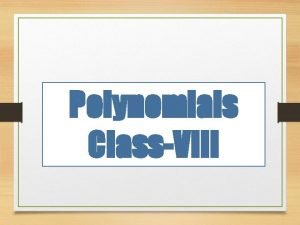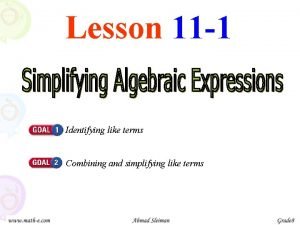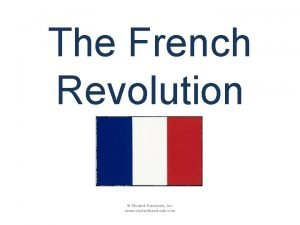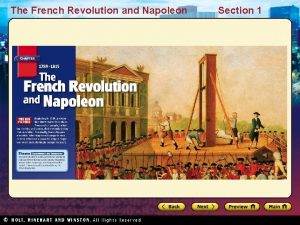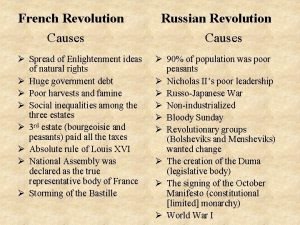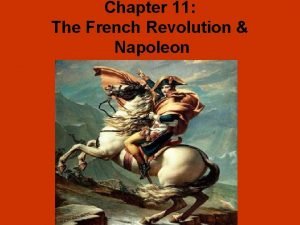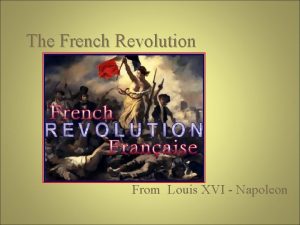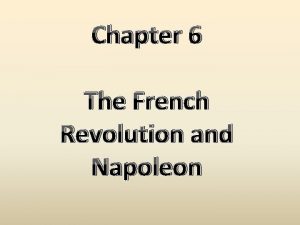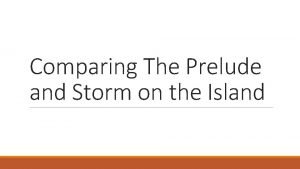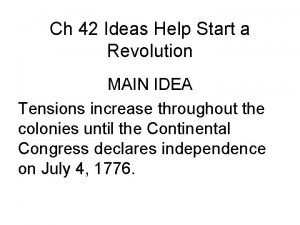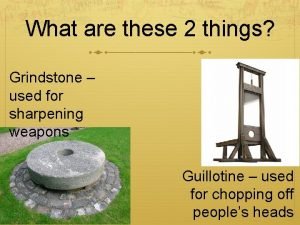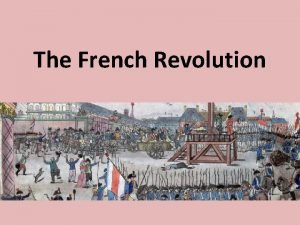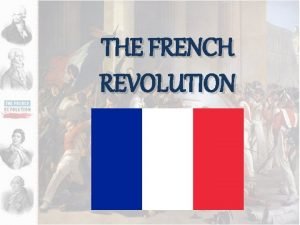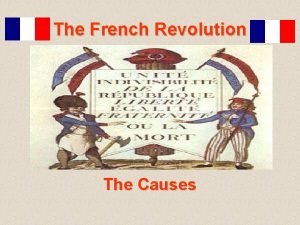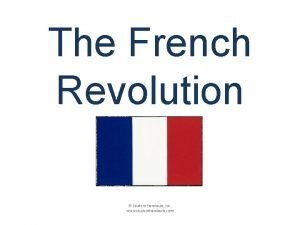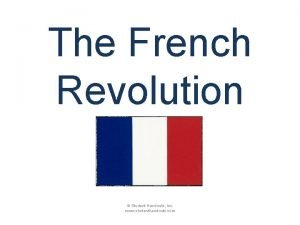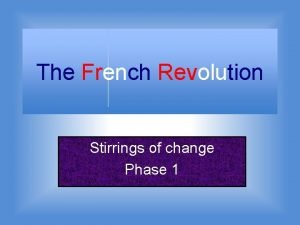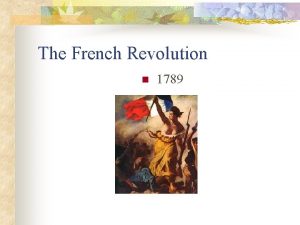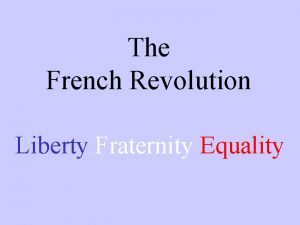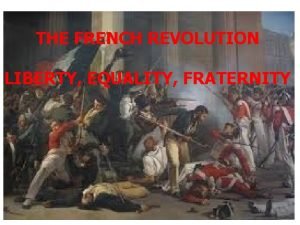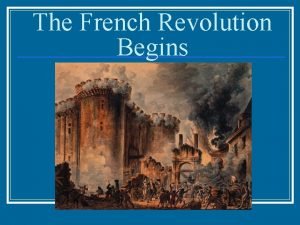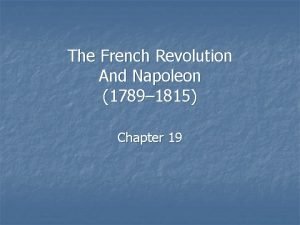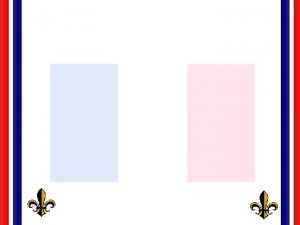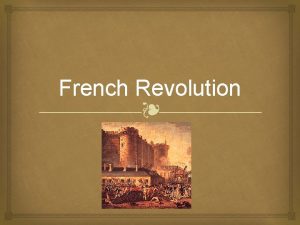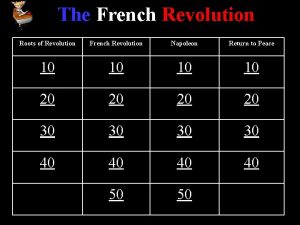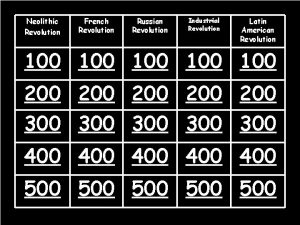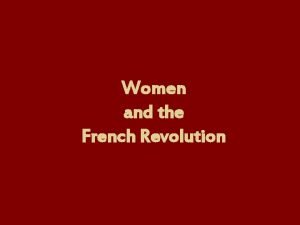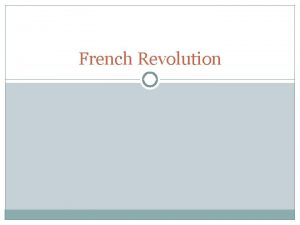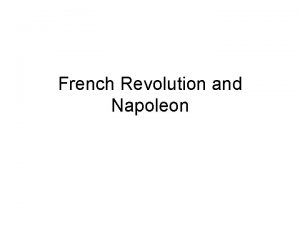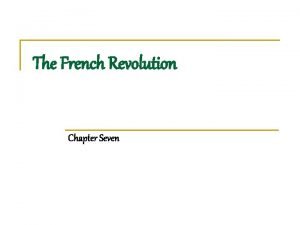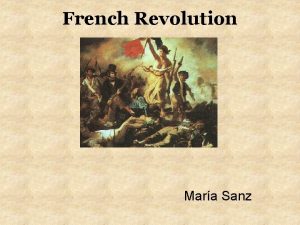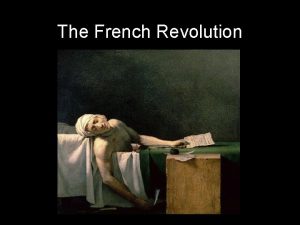Prelude to the French Revolution Terms and Ideas



![“The source of all sovereignty resides essentially in the nation. ” [The King’s] subjects “The source of all sovereignty resides essentially in the nation. ” [The King’s] subjects](https://slidetodoc.com/presentation_image/5bd9127ffe71e578708a393b32c81fa6/image-4.jpg)



































- Slides: 39

Prelude to the French Revolution Terms and Ideas

Neo-Classicism • Neoclassicism is a French art style and movement that originated as a reaction to the Baroque in the mid-18 th century and continued into the middle of the 19 th century. • It sought to revive the ideals of ancient Greek and Roman art. Neoclassic artists used classical forms to express their ideas about courage, sacrifice and love of country.

“Men are born free and remain free and equal in rights…. ” “…these rights are liberty, property, security, and resistance to oppression. ”
![The source of all sovereignty resides essentially in the nation The Kings subjects “The source of all sovereignty resides essentially in the nation. ” [The King’s] subjects](https://slidetodoc.com/presentation_image/5bd9127ffe71e578708a393b32c81fa6/image-4.jpg)
“The source of all sovereignty resides essentially in the nation. ” [The King’s] subjects of the third estate, equal by such status to all other citizens, present themselves…without other distinctions which might degrade them. ”

The Art of the French Revolution

David--Self Portrait

David--Oath of the Horatii

David--Death of Socrates

David--Brutus Receiving the Bodies of his Sons

David--Tennis Court Oath

Declaration of the Rights of Man • Approved by the National Assembly of France, August 26, 1789 • The representatives of the French people, organized as a National Assembly, believing that the ignorance, neglect, or contempt of the rights of man are the sole cause of public calamities and of the corruption of governments, have determined to set forth in a solemn declaration the natural, unalienable, and sacred rights of man, in order that this declaration, being constantly before all the members of the Social body, shall remind them continually of their rights and duties; in order that the acts of the legislative power, as well as those of the executive power, may be compared at any moment with the objects and purposes of all political institutions and may thus be more respected, and, lastly, in order that the grievances of the citizens, based hereafter upon simple and incontestable principles, shall tend to the maintenance of the constitution and redound to the happiness of all. Therefore the National Assembly recognizes and proclaims, in the presence and under the auspices of the Supreme Being, the following rights of man and of the citizen:

• 1. Men are born and remain free and equal in rights. Social distinctions may be founded only upon the general good. • 2. The aim of all political association is the preservation of the natural and imprescriptible rights of man. These rights are liberty, property, security, and resistance to oppression. • 3. The principle of all sovereignty resides essentially in the nation. No body nor individual may exercise any authority which does not proceed directly from the nation. • 4. Liberty consists in the freedom to do everything which injures no one else; hence the exercise of the natural rights of each man has no limits except those which assure to the other members of the society the enjoyment of the same rights. These limits can only be determined by law. • 5. Law can only prohibit such actions as are hurtful to society. Nothing may be prevented which is not forbidden by law, and no one may be forced to do anything not provided for by law.

• 6. Law is the expression of the general will. Every citizen has a right to participate personally, or through his representative, in its foundation. It must be the same for all, whether it protects or punishes. All citizens, being equal in the eyes of the law, are equally eligible to all dignities and to all public positions and occupations, according to their abilities, and without distinction except that of their virtues and talents. • 7. No person shall be accused, arrested, or imprisoned except in the cases and according to the forms prescribed by law. Any one soliciting, transmitting, executing, or causing to be executed, any arbitrary order, shall be punished. But any citizen summoned or arrested in virtue of the law shall submit without delay, as resistance constitutes an offense. • 8. The law shall provide for such punishments only as are strictly and obviously necessary, and no one shall suffer punishment except it be legally inflicted in virtue of a law passed and promulgated before the commission of the offense.

• 9. As all persons are held innocent until they shall have been declared guilty, if arrest shall be deemed indispensable, all harshness not essential to the securing of the prisoner's person shall be severely repressed by law. • 10. No one shall be disquieted on account of his opinions, including his religious views, provided their manifestation does not disturb the public order established by law. • 11. The free communication of ideas and opinions is one of the most precious of the rights of man. Every citizen may, accordingly, speak, write, and print with freedom, but shall be responsible for such abuses of this freedom as shall be defined by law. • 12. The security of the rights of man and of the citizen requires public military forces. These forces are, therefore, established for the good of all and not for the personal advantage of those to whom they shall be intrusted.

• 13. A common contribution is essential for the maintenance of the public forces and for the cost of administration. This should be equitably distributed among all the citizens in proportion to their means. • 14. All the citizens have a right to decide, either personally or by their representatives, as to the necessity of the public contribution; to grant this freely; to know to what uses it is put; and to fix the proportion, the mode of assessment and of collection and the duration of the taxes. • 15. Society has the right to require of every public agent an account of his administration. • 16. A society in which the observance of the law is not assured, nor the separation of powers defined, has no constitution at all. • 17. Since property is an inviolable and sacred right, no one shall be deprived thereof except where public necessity, legally determined, shall clearly demand it, and then only on condition

Louis XVI

The Three Estates

Liberty

Boilly -- The Standard Bearer

Revolutionary Calendar • In 1794 the Jacobins in an effort to sweep aside the old deemed it necessary to completely remake the calendar. The existing one after all perpetuated the fallacy of the traditional Christian church (wasn’t Jesus himself a good sans-culotte? )

• The new calendar came from the thoughts of Fabre d’Eglantine and became official in October of 1793. By law the year began on September 22 of the old calendar. The year consisted of 12 months, each of 30 days which left 5 days left over at the end of the last month. These 5 days (6 during leap year) were to be known as the Days of the Sanculottes and were national holidays. The five days were dedicated to Genius, Labor, Noble Actions, Awards and Opinion. The 6 th day was dedicated to the Revolution was the most grand solemn day of the year.

The days of the “week” (decade) were named numerically and what had been traditional saints days were now dedicated to a suitable agricultural implement, animal, fruit or vegetable. The year was divided into 4 seasons of three months each. Each “new” month was given a somewhat natural and attractive name.

Old Month Rev. Month Meaning September October November December January February March April May June July August Vendemiaire Brumaire Frimaire Nivose Pluviose Ventose Germinal Floreal Prairial Messidor Thermidor Fructidor Vintage Mist Frost Snow Rain Wind Seed Blossom Meadow Harvest Heat Fruits

The calendar was never overwhelmingly successful and was finally abandoned by Napoleon in 1804. With its ten day weeks workingmen found that they now had only one day’s rest in ten rather than the traditional seven.

David - The Army of Jugs

David - English Government

Celebration of Federation Day Bastille Day, July 14

Death of Marat

Death of Bara

David - Intervention of the Sabine Women

Napoleon as First Consul

Napoleon Crossing the Alps

David - Coronation of Napoleon

Goya - King Charles IV & Family

Francisco Goya Between 1810 and 1814 Goya painted his two masterpieces known as the Disasters of War. For the first time war was depicted as an glorious event. Now there are only killers and, of course, the killed. Note that in these works the artist has eliminated everything that is not relevant, thus forcing the viewer to become absorbed in the message.

Goya - 2 nd of May

Goya - 3 rd of May

The End of Napoleon

Liberty Leading the People
 Russian revolution vs french revolution
Russian revolution vs french revolution How could the french revolution been avoided
How could the french revolution been avoided Polynomial classification
Polynomial classification Like terms
Like terms Causes and effects of the french revolution
Causes and effects of the french revolution Causes and effects of the french revolution
Causes and effects of the french revolution French revolution
French revolution French revolution causes and effects
French revolution causes and effects French revolution causes and effects
French revolution causes and effects Enlightenment and french revolution
Enlightenment and french revolution What was the reason for the french revolution
What was the reason for the french revolution Chapter 11 the french revolution and napoleon
Chapter 11 the french revolution and napoleon Chapter 23 the french revolution and napoleon
Chapter 23 the french revolution and napoleon Jack and jill french revolution
Jack and jill french revolution The french revolution and napoleon section 1 quiz
The french revolution and napoleon section 1 quiz Chapter 11 the french revolution and napoleon
Chapter 11 the french revolution and napoleon Modern commercial agriculture
Modern commercial agriculture Kamikaze and the prelude comparison
Kamikaze and the prelude comparison Storm on the island structure
Storm on the island structure The designer expresses the ideas in terms related to the
The designer expresses the ideas in terms related to the Application domain and execution domain
Application domain and execution domain Ideas help start a revolution
Ideas help start a revolution Grindstone french revolution
Grindstone french revolution War with austria french revolution
War with austria french revolution French revolution calender
French revolution calender Committee of public safety
Committee of public safety 4 stages of the french revolution
4 stages of the french revolution French revolution causes
French revolution causes Short term causes of the french revolution
Short term causes of the french revolution The tennis court oath
The tennis court oath Causes of french revolution
Causes of french revolution The french revolution timeline
The french revolution timeline Fraternity in french revolution
Fraternity in french revolution Fraternity in the french revolution
Fraternity in the french revolution Four phases of french revolution
Four phases of french revolution French revolution causes
French revolution causes French revolution cartoons
French revolution cartoons French revolution essential questions
French revolution essential questions Chapter 7 section 1 the french revolution begins
Chapter 7 section 1 the french revolution begins Immediate cause of french revolution
Immediate cause of french revolution


